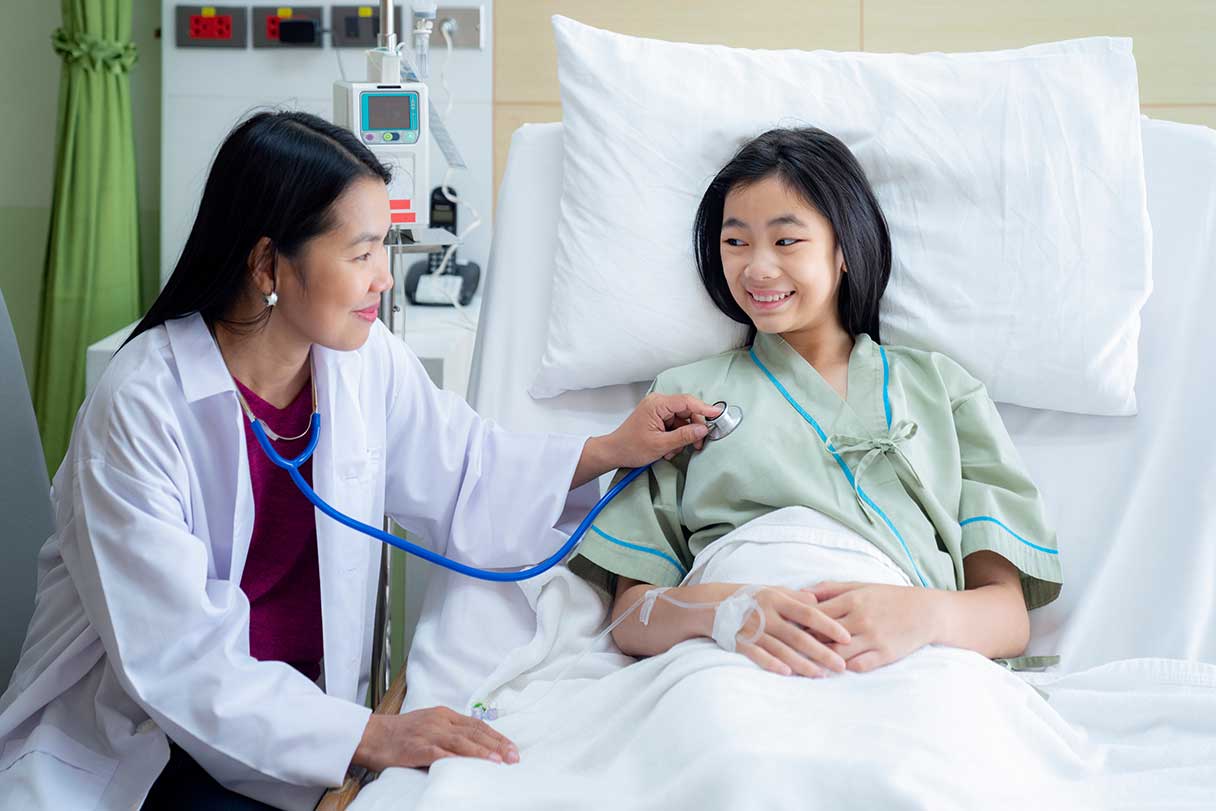You've just turned 45. You're feeling great and at your annual check-up when your doctor mentions that it's time to schedule your first colonoscopy. While the idea of the procedure isn't all that fun, it's important nonetheless — as the procedure allows a gastroenterologist to see inside your large intestine (colon) and rectum to screen for colorectal cancer.1
Both men and women are at risk for colon cancer, and colonoscopies are a very effective procedure for finding colon and rectal cancers. Colorectal cancer is the third-leading cause of death in the United States, but if found early, these cancers are highly treatable and the five-year survival rate is as high as 90%.1
Even better? Depending on the results and your individual risk factors, you might be able to go 10 years before getting your next one.2
Who Should Get a Colonoscopy?
The American Cancer Society recommends that men and women with average risk get colorectal screenings starting at the age of 45.3 If you have certain risk factors, your doctor might suggest starting sooner. Risk factors include:
- Family history of colorectal cancer
- Existing inflammatory bowel diseases (such as Crohn's disease or ulcerative colitis)
- Previous radiation treatments to treat cancer in the stomach or pelvic area
- Confirmed or suspected hereditary colorectal cancer syndrome (such as familial adenomatous polyposis or Lynch syndrome)
- Lifestyle factors (smoking, obesity, poor diet, etc.)3
Routine colonoscopies are usually recommended until 75 years of age.3
How to Prepare for a Colonoscopy
It may be beneficial to schedule your colonoscopy for earlier in the day as studies have shown that colonoscopies done in the morning have led to more accurate findings.4 The procedure itself typically lasts 30 to 60 minutes and most people are heavily sedated or put under anesthesia.1
Your doctor will give you full instructions ahead of your procedure, but the important thing is that your colon needs to be cleaned out.
Your doctor will also likely suggest you change your diet in the days leading up to the procedure. A few days before, you'll eat less fiber: no whole grains, nuts, seeds, dried fruit, raw fruits or vegetables. The day before, you won't be eating solid foods, so stock up on clear liquids (clear broth or bouillon), black coffee or tea, clear juice (apple or white grape), Jell-O or popsicles, to name a few.5
The day or afternoon before, you'll start the colonoscopy prep kit. This may include a combination of prescription and over-the-counter medications.2 Because of the preparation required (which we'll go into more detail about below), some people prefer to take off work for the prep day and the procedure day.
What Is a Colonoscopy Prep Kit?
The colonoscopy prep kit is what many people have heard is the worst part because of the taste of the liquid you have to drink, but flavors have gotten better over the years and there are several tricks for making it go down easier.
It's important to finish the whole prep kit even if your stool is clear or light yellow; your colon needs to be clear so that the doctor can see everything in there and take an accurate biopsy, if needed.6
There are two types of colonoscopy or bowel prep kits: both contain oral laxatives, just with different ingredients.
Polymer-based formulas (PEG) use a polymer-based laxative called polyethylene glycol 3350 (PEG). They are typically a powder that's designed to be mixed with water and it may be recommended to take with electrolytes or a sports drink. This option is highly effective and is much gentler for people with existing bowel conditions, or for those who are at risk of complications from fluid and electrolyte depletion (i.e., those with kidney, liver or heart disease). The downside to this prep option is you often have to drink up to four liters of liquid, making it difficult for some to complete the entire prep, which is essential for this procedure.6
In saline-based formulas, sodium phosphate (NaP) is the primary osmotic agent. They often include other mineral salts such as potassium and magnesium and come in a tablet. The tablet is easier to swallow and is just as effective as the other option, but the salts can irritate those with an inflammatory gastrointestinal disease and may not be the safest option for those with other preexisting conditions or risk complications from fluid-electrolyte shifts.6
10 Tips for Colonoscopy Prep
- Take your bowel prep with lemon and/or ginger instead of just water.
- If you're afraid of not being able to finish the whole prep kit, try a sulfate-free and flavored formula for better taste or a lower-volume formula so there's less to drink. The sodium phosphate solution (NaP) is often easier to take since it's in tablet form.6
- Plan for your prep by making sure you're at home and stock up on supplies in the bathroom: soft toilet paper, diaper cream, moist wipes and a book. You're going to be in there for a while!
- Wear comfortable clothes.
- Stay hydrated by drinking plenty of water. (The prep is dehydrating.)
- As mentioned before, try to take the day off of work on your prep and procedure days, if possible.
- Double-check when to start your prep and break it into four "doses" over the hour.
- Mix up your liquid diet (broth, Jell-O popsicles).
- Ease back into solid foods after your colonoscopy.
- Ask any questions you might have ahead of time to ease your mind.
Cost of Colonoscopy Prep
According to the American Cancer Society, there should be no out-of-pocket costs for a routine colonoscopy procedure or prep. That being said, if your doctor does have to remove something, it becomes a diagnostic colonoscopy and then your insurance may or may not cover it. You may want to consider calling your insurance to double-check before your procedure.7
The average cost of a colonoscopy is $2,750, but the total can range from $1,250 to $4,800, depending on where you live, where you have the procedure performed and what your insurance covers (if you have insurance). For example, outpatient centers may be less expensive than an inpatient facility like a hospital. If you do have health insurance, make sure all of the providers that will be used are in-network, including the anesthesiologist.
Other factors that influence the cost include any prescriptions your doctor might recommend, like a sedative or painkiller, and any follow-up appointments needed. These appointments may or may not be included in the cost of the procedure.8
CareCredit Financing for Colonoscopy Procedures
If your colonoscopy procedure is not fully covered by insurance, you can use your CareCredit credit card to help pay for the costs.* Use our Acceptance Locator or download the CareCredit Mobile App to find a provider near you who accepts the CareCredit credit card.
Author Bio
Abbie Mood is a freelance writer with more than 10 years of experience. She has worked with clients of all sizes to create compelling content and she has written for the American Kennel Club, Marriott Bonvoy, Women's Health Online, Headspace, and more.








